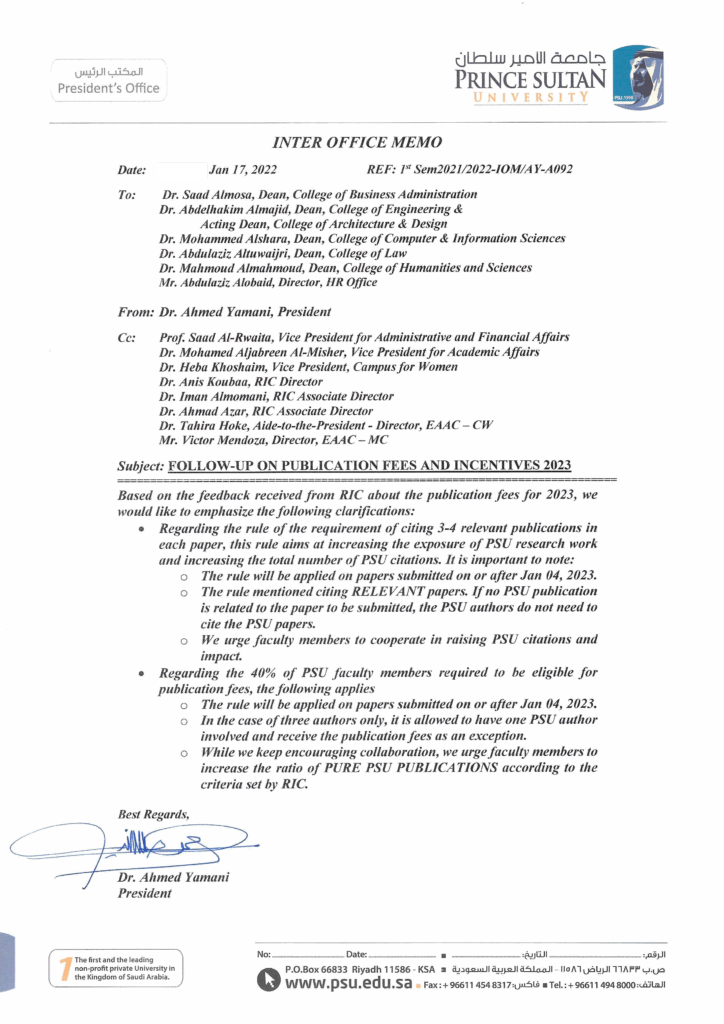At Prince Sultan University in Saudi Arabia, faculty members must help raise their school’s academic standing not by doing impactful work, but by citing the institution’s research in their papers, according to a document Retraction Watch has obtained.
In an interoffice memo from 2022, Ahmed Yamani, president of the Riyadh-based institution, referred to “the rule of the requirement of citing 3-4 relevant publications in each paper” whose aim was “increasing the exposure of PSU research work and increasing the total number of PSU citations.”
Coordinated citation efforts can boost the rankings of institutions and individual researchers. The Committee on Publication Ethics considers citation manipulation unethical.
The memo, titled “Follow-up on publication fees and incentives 2023,” added, “If no PSU publication is related to the paper to be submitted, the PSU authors do not need to cite the PSU papers.” It continued, “We urge faculty members to cooperate in raising PSU citations and impact.”
Yamani did not reply to requests for comment.
We have reported in the past on coercive citation at Iraqi universities, where both students and researchers are required to cite their institutions’ journals and research.
The Saudi policy differs by including the clause on relevance – an apparent nod to intellectual freedom and research integrity, said Diana Hicks, an expert in publication metrics and a professor emeritus at the Georgia Institute of Technology in Atlanta.
Despite this, she told us, “it certainly feels like mandating metrics gaming and so would encourage a culture not focused on integrity.”
Ludo Waltman, an expert in research assessment at Leiden University in The Netherlands, agreed, calling Prince Sultan’s citation requirement “highly problematic.”
“Because of the ‘relevance’ criterion, this perhaps doesn’t constitute coercive citation in a strict sense, but in a practical sense this memo puts strong pressure on PSU researchers to cite work from their own university, so this is very close to coercion,” he told us. “It is also problematic that the ‘relevance’ criterion states that PSU researchers don’t need to cite PSU work if they cannot find relevant work. The criterion should state that PSU researchers must not cite PSU work if it is not relevant.”
The memo referred to feedback received from the school’s Research and Initiatives Center on “the publication fees for 2023.” To be reimbursed for publication fees, the memo stated, 40 percent of a paper’s authors must be faculty members at the university. Whether this policy is meant to prevent the school’s researchers from being gifted authorship simply to help pay publication fees is unclear.
Earlier this fall, Mohamed Bououdina, a hyperprolific physicist and administrator at Prince Sultan, lost a 2024 paper in Heliyon due to the addition of eight irrelevant citations, according to the retraction notice.
Elsevier, the journal’s publisher, would not tell us which citations it found irrelevant. But at least two references coauthored by fellow Prince Sultan physicist Mohammed Benali Kanoun could qualify. The works are cited after a sentence stating nanomaterials ”are more hydrophobic than conventional bone grafts,” although neither reference mentions hydrophobicity or bone grafts.
Bououdina, who is an aide to the university’s president and associate director of the Research and Initiatives Center, also has earned a retraction for using tortured phrases suggestive of plagiarism in another paper. He has had several papers flagged on PubPeer, including for potential image manipulation and data fabrication. Bououdina did not respond to a request for comment.
Waltman said he did not know how common institutional self-citation policies are. But he stressed that ”choosing citations politically, rather than purely based on relevance, is not specific to particular countries or regions. This is done by researchers all over the world, but usually in more subtle ways, without explicit policies that mandate this.”
Like Retraction Watch? You can make a tax-deductible contribution to support our work, follow us on X or Bluesky, like us on Facebook, follow us on LinkedIn, add us to your RSS reader, or subscribe to our daily digest. If you find a retraction that’s not in our database, you can let us know here. For comments or feedback, email us at [email protected].


The university that I was at wanted everyone to become part of multi institution research groups, so that they all could cite each others papers, because citations between institutions are worth more. I think everyone is trying to do something like this, it is just a case of how blatant are they, and is it a formal requirement of the institution. Academics are often told that these are ways to increase the research ranking of your research area, so you should look at these things.